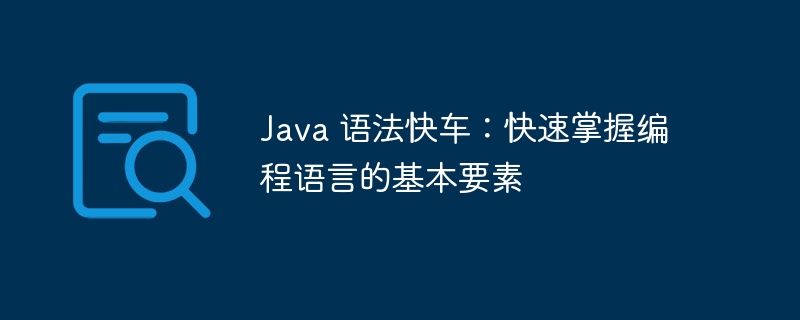Home >Java >javaTutorial >Java Syntax Express: Quickly master the basic elements of the programming language
Java Syntax Express: Quickly master the basic elements of the programming language
- WBOYWBOYWBOYWBOYWBOYWBOYWBOYWBOYWBOYWBOYWBOYWBOYWBforward
- 2024-04-03 13:01:051191browse

Java is a cross-platform programming language. With the popularization of the Internet and the continuous development of computer technology, Java is increasingly used in the field of software development. However, for beginners, the complexity of the Java language and the vast body of knowledge can often be daunting. PHP editor Xin Yi specially compiled the Java Grammar Express Guide, aiming to help beginners quickly master the basic elements of the Java programming language and lay a solid foundation for future in-depth study and practice. After mastering the basic elements, Java's rich features and powerful functions can be seen at a glance.
Variables are used to store data, and data types define the types of values that variables can store. Java supports various data types, including primitive types (such as int, double, boolean) and reference types (such as String, ArrayList). Understanding the characteristics of each data type, such as range, default values, and operations, is fundamental to understanding Java programs.
Expressions and operators
An expression is a set of instructions for calculating a value, usually involving variables, constants, and operators. Java provides a rich set of operators, including arithmetic operators, comparison operators, and logical operators. Understanding operator precedence and associativity is critical to correctly understanding the evaluation of expressions.
Control flow
Control flow statements control the order of program execution. Java provides if-else, switch-case, and loop statements such as for, while, and do-while to implement conditional execution and iteration. Understanding the syntax and semantics of control flow statements is critical to writing robust and reliable code.
method
Method is an encapsulation of a group of related statements used to perform specific tasks. Methods can receive parameters and return results, allowing for code reusability and modularity. Understanding the mechanics of method declaration, invocation, and parameter passing is critical to organizing and maintaining Java code.
Classes and Objects
Java is an object-oriented language, in which classes and objects are the basic concepts. A class is a blueprint for a group of things with similar properties and behaviors, while an object is a concrete instance of a class. Mastering class and object creation, inheritance, and polymorphism is critical to understanding the structure and organization of a Java program.
Error handling
Error handling is an important aspect of Java Programming. Exceptions are objects that represent errors or unusual conditions. Java provides try-catch-finally blocks and other error handling mechanisms so that programmers can handle exceptions gracefully, prevent program crashes and maintain its robustness.
Other important concepts
In addition to the above basic elements, understanding the following concepts is crucial to mastering Java syntax:
- Access modifiers (such as public, private, protected) control access to classes, methods and variables.
- Wrapper classes (such as Integer, Double) represent basic data types as objects.
- Array is used to store a collection of elements of the same type.
- Java CollectionsFramework provides a powerful collection of data structures and algorithms.
Practice and Application
Mastering Java syntax requires not only theoretical understanding, but also practical application. Through writing coding exercises, solving programming problems, and building small projects, you solidify your understanding of fundamental elements and develop an intuitive command of the language.
The above is the detailed content of Java Syntax Express: Quickly master the basic elements of the programming language. For more information, please follow other related articles on the PHP Chinese website!

